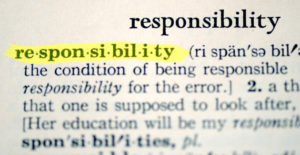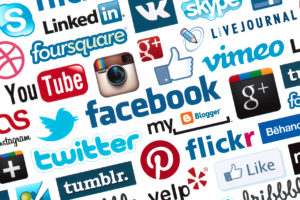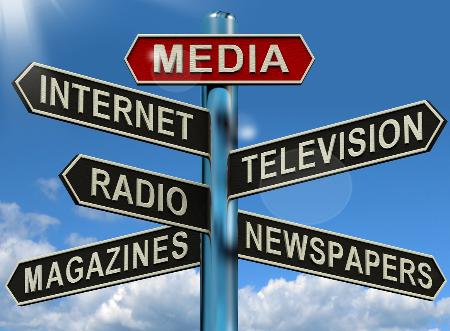Does the media have a moral responsibility? – Xavy Bull
Xavy Bull, an aspiring thinker, explores whether media has a moral duty within modern society.
It is obvious that in our society the media possesses a huge amount of power. Is this reason enough to suggest that the media does indeed have a moral responsibility? I shall conclude that this is reason enough, and will show that the responsibility of the media is perhaps greater than one may have previously believed. In this investigation, we will also necessarily discover to whom this responsibility is related and in which ways. The type media we are particularly referring to in this investigation are the news outlets; these can be through television, radio, newspapers and, more relevantly, social media. It is also necessary to narrow this further to suggest that we will be discussing the kind of news outlets operating in those countries one would normally consider to be liberal; those that enjoy freedom of press: this is because it is only those with free will- and by extension a party with free will- that can be said to have any responsibility.
Looking at the issue merely in terms of practicality for society, one would leap to the conclusion that of course the media has a responsibility. This reference to media meaning news outlets- referring here to them as a collective body; that is, a singular party either with, or as may be proved, without, collective responsibilities. It may be suggested that this responsibility is imparted because the citizens of dependency upon it for information. People arrange their lives around what they are told by the news: whether or not there will the appropriate weather to go to the beach at the weekend, or, which is far more influential, who to vote for. Indeed, it is through the media that the populous receives information about the political affairs of the country, and during an election this, of course, is where the majority find information about party policy; it is these same news outlets that organise debates between parties. Now, this dependency, one may suggest, means the news has the same moral responsibility as a parent for their child who has a moral responsibility for their child’s actions. In order to see whether this is an effective argument we must discover what it is that gives the parent this moral responsibility and whether or not this is analogous with the media. A child is, as said, dependent on a parent and this parent must provide things of two categories: (1) food, clothing, shelter, emotional stability/support; these are, all those things necessary for survival and the most basic quality of life. Note the ‘things’ within the category change as the child develops, albeit, a certain level of emotional dependency may continue throughout the child’s life, but the others later dissolve into the duty of the child itself. Beyond this a mother must provide a second class of thing, (2) those things which prepare a child for an independent life dictated by free will. Within (2) a parent has the responsibility of passing on information about society, and that learning which we normally pass into the hands of schools. A child is dependent on a parent as they provide, as in (1), the things needed to survive, and as in (2), the things needed to be successful in their society. Here one may suggest that the media differs from a parent as it does not provide the kind of things in (1). However, it does distribute information some of which is important in our lives; as mentioned the information dictates our actions daily and it even contributes to our decisions in elections, in this sense the media also possesses the kind of things found in (2). Upon close inspection, it seems that the media does in fact provide information which is very important in the recipient’s life. So, in this way, because of the relationship of provision and dependency perhaps we see a very weak moral responsibility; but as it is, this duty can only be seen to be to keep providing the kind of information it does currently to help us function in society. We shall discuss what this means later.

A parent of course has a far greater moral responsibility; yet I do not believe this is just because it provides the things in (1) which are necessary for survival, the things which of course are not distributed by the media. A parent is the person in society who is nominated to provide the child with what is needed. However, there is another aspect which gives a parent moral responsibility, this is control. A parent is expected to have power over their children’s actions. I find it that this power entails responsibility, a power given due to the dependency of the child. We, for this reason, punish both child and parent when the child acts inappropriately. This power is surprisingly powerful, but it is not the kind of objective power the state or the media, as will be discussed, has. The reason that a parent has such power over their child is entirely subjective, it is because of the emotional intimacy of the relationship between the two. One child’s parent will not have the same degree of control over another’s child, we intrinsically have respect for parent figures, giving them power, but especially our own and it does not seem that this is simply because they are the ones providing (1) and (2). It is true that the media do also have power over the population and this shall be the next argument for a moral responsibility. The power of the media over the population is of course very different from that of a parent over a child, the kind of power traditional media sources have is entirely objective and it is therefore necessary to move from the position of comparison with the parent-child relationship but instead the relationships of other large parties with power and individuals; ones that we do consider to have some form of moral responsibility.
The media’s power over the population is huge, now more than ever, it has a total monopoly on the distribution of certain pieces of information. In this respect the media is more powerful even than the state; it is of course the media which may dictate the minds of the population deciding the structure and leadership of the state. A party of such scale one would intuit to have a moral responsibility and a huge one at that. Yet this is feeling is not reason enough to subject the media to such a conclusion. Trying to arrive at this conclusion demonstrably we must assess what it means to have power of this kind. To have power over somebody or something is to have control over its operating faculties in some way; that is, to have power is to limit an agent’s freewill. The state does this by imposing laws and enforcing them through institutions such as the police force. In taking some or all our operating faculties away the imposing party has a duty to operate a provision on our behalf. For instance, it is well established that the state, and thereby the police force, gains its legitimacy in this way. In a simple example, the state takes away our right to distribute justice- for instance, if someone were to steal from a man he would not be entitled to seek justice himself- this task is handed over to the state. In this way, if a crime were committed against one citizen, the state has a duty to seeks justice for the victim as he has deprived him of the ability to do it himself. Similarly, following the arrest of the alleged criminal, the state has a duty to provide legal aid to the defendant. The latter duty stems from a far more foundational duty, this being the duty to protect its citizens from harm. This includes maintaining a citizen’s freewill within the parameters of the state, if there is no good reason to restrict it. It must be noted that in restricting the freewill of the citizen the state must have a presupposing legitimacy through consent; a government in control which is not consensual, it is largely argued, cannot be legitimate within regular circumstances. The media it can be argued suffers a similar situation, the media does have consensual access to our lives; albeit that it may not seem so with the broad and penetrative arms of the news media accessing all platforms of computer technology. Similarly, the news media does remove part of our freewill both directly and indirectly, simply by feeding us information it directly removes our faculty of information collection. Granted most of the information if feeds to us we would be unable to discover alone so the kind of information which affects this faculty is very basic in our lives such as information on the weather or traffic news. Whether we obtained this information through the media or ourselves would make no difference. We can conclude one thing from this, if the media were to feed us ‘fake news’ they would not be fulfilling their responsibility as our lives may become hampered by allowing the media to feed us this information. Indirectly the information we are delivered has a much greater effect.

Given the total monopoly on information that the media possess it is possible for it as a collective to control the actions of the population. It is not hard to think of examples of such practice, one must only look to the totalitarian communist regimes of the 20th century. Under Stalin and subsequent leaders, the control of the media was intense with very few official outlets being authorised, all of which broadcast the word of the Communist Party. Similarly, in the DPRK the news circulation is limited the propaganda the state permits. This has led to wild indoctrination with the leaders of the DPRK being idolized. This evidences the power the media may potentially wield if so willing. In this hyperbolic scenario, the media has huge indirect power over the actions of the people. However, this may still be the case in what is perhaps a much more frightening reality given its distinct possibility. Unlike in the drastic example of communist nations we would not expect the media to deliver only one opinion in liberal democratic countries, which are the subject of this investigation. However, we must acknowledge that having the as the only distribution network of certain types of information, does indeed limit our understanding and hereby our available actions. We are only given a distinct number of perspectives on information from different media sources, therefore, we have only two options in processing the information we receive. We may choose to pick a singular news outlet- such as FOX NEWS- and take its word to be the literal truth. Or we can try to monitor several news sources and from multiple perspectives infer the true set of events. One may suggest that the latter is clearly the preferable option as we are not then directly guided by the opinions of a specific sector of society, thus being more free as one is making a greater choice as to how to act. For example, if during an election the media in the UK told only to vote for the Labour party and no other party, in fact they did not mention the other parties if not through slander, the number of supporters for Corbyn would rise even more than it is currently is. His supporter demographic would broaden beyond pacifist students and he would surely embrace a huge majority of the voting population. Alternatively, if everyone was to choose to only receive information from one outlet which supported Corbyn. In the second case, people have the opportunity to decide whether to support Labour, The Liberal Democrats or any other party they decide fits their views the best. (one may wish to evaluate this final point further: they can choose which party fits their preexisting opinions the best. One may question this on grounds that these preexisting opines are again dictated by some foreign bodies, which is are in large the media outlets of all kinds. This brings up a discussion of freewill which although fruitful is long winded and tangential from the topic at hand). In either case through direct belief or through inferred belief we are limited to a distinct class of ideas/opinions/beliefs which we can receive and understand; this means our free will is always hampered. This fact would perhaps be mitigated if the media were to always show only evidenced statistics and infer no opinion themselves leaving this to the recipient. However, here we still run into problems the media can never present every fact about a scenario, therefore we cannot include this as part of its responsibility. The responsibility must be far greater and less specific to be achievable; something which any ethical conclusion must achieve.
Any party with power, which the media possess as shown directly above, has a certain duty to the population. In taking away an operating faculty of our free will the replacement must fulfil the role of this faculty, this is what is said above. However, what isn’t mentioned is that the replacement must work for the same purpose as the faculty. For instance, the state removes a huge amount of our freewill and in so doing imposes social stability and order, this is in line with our purpose: survival. (I must now note that given I see no convincing reason for believing in a supreme deity or any other deity, when discussing purpose, I simply mean it in an atheist sense which I see to be survival. This can either be personal survival or the survival of our species). The states control works towards this purpose in both senses, as it provides the opportunity to easily access food and all those other things necessary for survival- notably the same things mentioned in (1) when referring to what a parent provides their child with. I believe it to be the same case with the media. It must fulfil the purpose we would seek without it, fundamentally survival. What this means for the media is not as obvious as for the state. The media does not directly control our actions in the way the state can forcibly limit our movement, speech etc. yet it controls our beliefs an idea which is perhaps more powerful. Therefore, if our beliefs are so powerfully controlled by the media it is the duty of the media to make sure the ideas/opinions/beliefs which it distributes are in line which the beliefs we have instinctually; beliefs that aid survival. Hereby, the media’s responsibility is to provide information which will aid survival. The implications of such a conclusion are broad yet achievable and not far from the status quo.

Most easily, which has already been mentioned, the responsibility of the media is to keep providing the kind of information which allows our lives to function smoothly on the back of it. Beyond this what must news provide? Firstly, the conclusion reached seems to show that the media may not distribute any information known to be false. The reason for this is that the deception of an individual or of a large body clearly doesn’t work towards society’s functioning and as such deception by the media is wrong- this point can be explained further but it seems clear enough without need of further discussion. Does the conclusion of the media working for the good of survival, and thereby society- given society is a construction to accommodate survival- mean that there are certain types of news which the media cannot broadcast? This is a concern any liberal society may have, following the conclusion made above, given the libertarian sentiments which lay the foundations for our laws. One such law, always regarded with the highest esteems is that of freedom of speech. Some may already object to the remarks being drawn here suggesting that even by drawing the media into a moral obligation of truth-telling we are breaking this right. Nonetheless, this argument fails to recognise the purpose of rights and laws. We create such legislation to uphold moral values, therefore if we can demonstrably conclude that the moral duty for the media is to aid survival, as is the purpose of any institution with power in a nation we should be moulding rights around such a conclusion rather than morality around such rights. Moreover, I would suggest that beyond the need to not distributer lies the right to free speech is not impeded by this conclusion. The reason for this is like what has been hinted at above. We must recall that the media should not be seen as a singular body but as a collective of distinct independent outlets and as such I do not see it to be the case that the media will have to be constantly checking that the news it produces is in line with its purpose, or at least not in much depth. As long as it produces news it regards as truthful and not to the purpose of societal derision, then the format of multiple outlets will allow for multiple opinions, optimising the receivers freewill by being able to choose/infer from multiple perspectives. This also stops the wrong, yet worrying, implication from this essay; that is, if the media has a duty to society it cannot produce any material which questions society’s structure/leadership/sentiments etc. This of course would be a rash judgement which misses the point of the media’s duty. The duty of the media is not to stop all conflict in society, just to try to aid survival (and not even directly, but through the distribution of opinion and fact) which require academic debate and critique of society in order of development and growth. In this way, the conclusion drawn here does not degrade free speech but advocates its endorsement as this is beneficial to society- a point too long to justify here, but has been done so extensively elsewhere.
We find it then to be that the media does in fact have a moral responsibility; a responsibility to society. This responsibility has been imposed upon it due to the medias immense power over society and the individuals within it; a power which is only growing as the news media is incorporated into all aspects of our lives through social media. In fact, the power of technology is becoming so influential philosophers such Any Clark and David Chalmers are advocating ideas of extended cognition suggesting that we can no longer regard to intellect to operate just within our bodies but in fact computers and other technology can feasibly be argued to be part of our mind (The Extended Mind 1998). The duty of the media is that of aiding human survival in a very broad sense, as is the duty of any power within society.















Post Comment
You must be logged in to post a comment.